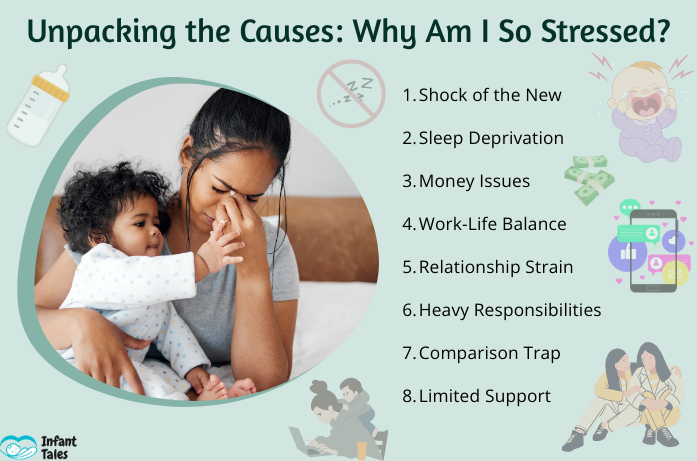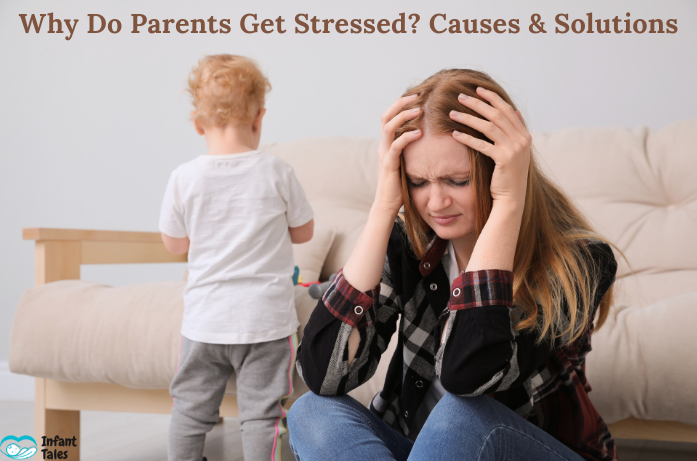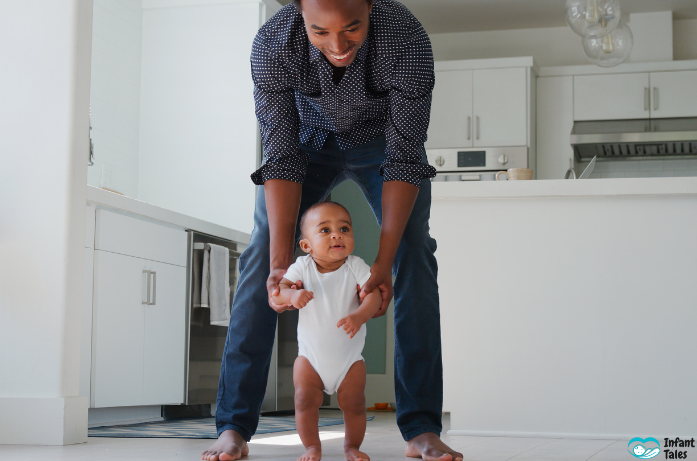Parenting is beautiful, but it also comes with challenges that often go unseen. If you’ve ever wondered why do parents get stressed, the truth is that the emotional, physical, and mental demands of raising a child can pile up quickly. From sleepless nights to constant responsibilities and the pressure to “do it all,” stress becomes a normal yet overwhelming part of parenthood. At Infant Tales, we believe in addressing these realities honestly while offering practical support and solutions to help you navigate them with confidence.
The Hidden Weight of Parenting
From tantrums to dirty dinners and unfinished laundry, parenting stress is a huge issue. A lot of it is deep-seated, something simmering below the surface that parents carry with them every day. Parents have higher levels of stress than adults who don’t have children; however, according to the American Psychological Association, this stress doesn’t go away. If allowed to build up, it eventually interferes with your physical health, takes a toll on your mood and causes strain on your relationships.
Another reason is that juggling acts never end. Parents are everything; they are caregivers, employees, partners, friends, and sometimes even the caregiver of their own parents. Besides all of that, there’s also the mental load: planning meals, scheduling doctor appointments, worrying about milestones, and running the household. And that list just continues in your head, never shown to anyone but felt by you every day. With time, that invisible heaviness weighs a ton on parents, draining them and leaving them on the brink of parental burnout.
A Real Mom’s Voice: Marina’s Story
After having a baby, my life completely changed. Between caring for my little one, I almost forgot about myself, my own self-care took a backseat, and I hardly found time for my partner. Stress started to build up as I tried to manage everything: raising the baby, giving time to family, handling household chores, and preparing baby food.
In all of this, I felt like I had lost myself, messy hair buns, no time for fashion or even a little self-love, because the baby always comes first. And if you’re a working mom, balancing a job with childcare is even tougher. Parenting is beautiful, but it’s also exhausting, and many of us end up living under constant stress and tension while trying to hold everything together.

Unpacking the Causes: Why Do Parents Get Stressed
The causes of stress differ with every individual. But the ones that really tick off parents are small things piling up. Let’s think about some of these major stressors.
1. Shock of the new: a steep learning curve.
Think about this: no baby book could prepare you perfectly. Feedings, crying, diaper changes, and swaddling, the nonstop intensity can become too much for new parents who may feel mentally drained at that point.
2. Sleep deprivation: The ultimate stressor.
The loss of sleep is an experience all parents know quite well. In the absence of adequate rest, even the smallest of incidences start to feel daunting. Sleep deprivation harms your mood, impairs your memories, and diminishes your patience, which together make every hurdle in parenting harder.
3. Money issues
Raising a child is expensive. From diaper expenses to childcare fees, to doctor’s bills and cost of education, everything adds up fast. For several families, the continuous stress over money adds to their pain and suffering.
4. Work-life balance: walking a tightrope.
It’s impossible to balance working and being a parent. Work emails, calls, and childcare overlap in ways that blur boundaries. There is a constant feeling that one is failing at both-fronted grounds of parenting-which adds to the daily parenting stress.
5. Strain on Your Relationship
A baby suddenly shifts the attention from romance to childcare. Exhaustion, miscommunication, and dueling parenting styles melt away the warmth from a partnership into a type of organizational existence, putting family relationships under pressure.
6. The Weight of Responsibility and Worrying All the Time
Parents carry huge responsibilities. Worries of eating, sleeping, and milestones constantly feed into each other. This endless loop of worry turns into emotional stress and leaves many parents anxious and drained.
7. Too Much Information and the Comparison Trap
Parenting advice is everywhere-a cacophony of conflicting voices that confuse each other. Social media tightens the screws by showcasing that “perfect families.” The moment you pit yourself against others is the moment guilt, doubt, and stress always come knocking at your door.
8. Limited Support System
Not all parents get family or babysitting help. Without a solid parenting support system, the daily grind of parenting becomes too much. The lack of help often results in feelings of isolation and exhaustion.
How Parental Stress Affects Families
Stress is never an isolated thing. Sometimes with too much parental stress, life collides with the family. According to research from Child Trends, high parental stress has been shown to coincide with children’s emotional distress, behavioral problems, and lower academic achievement.
Because once you’re tired, once you’re distressed, patience starts to fail. You may find yourself becoming restless; emotionally isolated; or too tired to play. Children pick up on this energy, and it affects their sense of security and self-esteem. The good news: To create a calm and healthy family environment, the first thing to do is actually recognize its impact.
From Surviving to Thriving: Actionable Solutions for Stressed Parents
We’ve established that parenting stress is real and legitimate. But the important thing is this: stress can be managed. The goal is not to eliminate it completely, which is impossible, but to develop resilience and find practical solutions.
1. Embrace the “Good Enough” Parent
The fastest way to burnout is trying to be perfect. Providing a perfect environment is impossible, and children don’t need perfection. As pediatrician D.W. Winnicott explained, a “good enough” parent who provides love and consistency is more than enough.
Children don’t need a clean house or a mother who makes delicious meals; they need to connect with someone who cares about them. Let the house be dirty sometimes. Order pizza for dinner. You are okay the way you are, and your child needs to understand that it’s okay to be imperfect.
2. Prioritize Sleep (Really)
Sleep is the ultimate stress relief for parents, but often the hardest to get. Try splitting nights into shifts with your partner, so each of you gets at least one solid block of rest. Nap when your baby naps, ignore the dishes. If a friend offers to watch the baby for an hour, say yes and get some sleep. Even 20 minutes can reset your mood and energy.
3. Build and Lean on Your Village
It is said that the adage “It takes a village to raise a child” is true. Let people in because loneliness breeds stress. Try reaching out to other parents through neighbourhood or online parenting support groups; you’ll discover that many people have similar parenting difficulties.
4. Set in Time Small Pockets for Yourself
Self-care does not have to be an elaborate ritual. It is about getting little refreshers so that you can present yourself at your best. Maybe that is an uninterrupted 15-minute walk listening to your favorite podcast, or a much-needed hot shower, or an engaging read that is not about parenting. Consistency is important-kick these moments into your busy calendar and treat them as sacred.
5. Communicate, Communicate, Communicate
In parenting, good communication is the backbone of teamwork. Express your needs; if you require help, do ask for it instead of dropping hints. Ambiguous or dishonest communication leads to resentment that may weaken your bond as you adjust to this major life change.
6. Practice Mindfulness & Stress Relief Habits
Tiny things do make a difference. Try some breathing exercises, short meditation sessions, or being mindful throughout your day. Also, maintain a balanced diet, engage in light physical exercise, and modestly control your screen time. Promote small celebrations that serve to boost confidence and lessen the everyday stress of parenting.
7. When to Seek Professional Help
If stress feels as though gripping your heart and mightily keeping you down, persistent sadness, irritability, and detachment, perhaps a sign of help should be sought. postpartum depression (PPD) and postpartum anxiety (PPA) are common. There is courage in requesting help. You deserve help, and your child deserves to have a parent who is healthy and supported. The National Institute of Mental Health offers trusted guidance and treatment resources for new parents.
Everyday Stress Relief Tips for Parents
- Exercise regularly: Even light stretching or yoga helps release tension.
- Eat right: Balanced food helps to keep energy and mood in check.
- Limit screen time: Looking at too much news or social media raises anxiety.
- Celebrate small wins: A few good naps, smiles, or even a nice bedtime story.
- Stay connected: Hang out with other parents; you will realize you are never alone on this path.
FAQs About Parental Stress
Q1. Is it normal to feel stressed as a new parent?
Absolutely. Parenting is a major life change, and stress is a natural response. What matters is that you learn to deal with it in healthy ways.
Q2. Could my child be affected by parental stress?
Yes. Children sense a parent’s mood. Children might respond negatively and feel emotionally secure when there is too much stress, but you are able to reduce stress to give a more even calm environment.
Q3. How can I manage stress when I have no family support?
Build a parenting support system in other ways: local parent groups, online communities, or trusted friends. Even small amounts of support can make a big difference.
Q4. What are quick stress relief tips I can use daily?
Deep breathing, short naps, a walk outside, listening to music, or even a quiet shower can all help reset your mood in just minutes.
Q5. How do I stop comparing myself to other parents?
Limit social media if it makes you feel inadequate. Remember, no parent’s life is perfect, what you see online is only part of the story.
Final Thoughts
Parenting can be stressful, but it doesn’t have to control your experience as a parent. If you focus on letting go of the need to be perfect, seek out support, and find ways to relieve stress each day, you can help create a peaceful and joyful atmosphere for both you and your child. Remember, taking care of yourself is just as important as caring for your little one.
👉 At Infant Tales, we want to remind you that you are never alone. Share this article with a parent who may need reassurance, and join our community for more helpful parenting tips.



